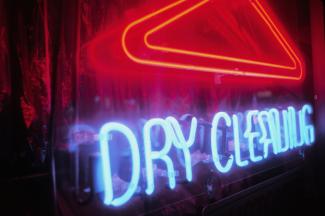
‘Dry clean only’ is probably a phrase that you have seen before. You see it on the labels of certain pieces of clothing – like smart jackets, trousers and skirts, and ties or other silk garments. Next to the words, or above them, you’ll also so a capital ‘P’ with a circle around it. It’s the ‘P’ my mum always taught us to avoid when buying clothes. ‘P’ means it has to be dry-cleaned, and dry cleaning is expensive. ‘P’ stands for ‘perchloroethylene.’ That’s the chemical that is used in the machine to ‘dry clean’ the clothes because water would damage – stretch, shrink, fade – the fabric. I know quite a lot about this because every Saturday from the age of 15 to 18 I worked at a dry cleaning shop. I greeted customers, advised them about their clothes, pinned tickets onto anything we took in, sorted the clothes into ‘loads’, sent them to the machine, steamed them when they came out, sent them to be pressed, put plastic bags on them when they were done, hung them up in numerical order, and took the money for them when they were collected. At the end of the day, I helped to clean the floor, and once I even cleaned the walls. It was my first job: it was not particularly fun, and it was not at all glamorous, but, looking back, I think it was important. I’ll try to explain why.
The only reason why it was important back then was the money. For the first year I earned four pounds an hour, and after that it was five. It’s almost unbelievable now: that’s the physically hardest job I’ve ever had and the least I’ve earned. But it paid for my social life, my mobile phone credit, a weekly copy of the NME, a holiday to Portugal after my 'A' Levels, and, thanks to extra shifts in the summer holidays before university, my first laptop.
One of the reasons why that job seems important now is because it was the first time I spent on an equal level with adults. As a teenager, the only adults you tend to regularly spend time with are the ones who have authority over you: your parents and your teachers. But having a job gives you a chance to mix with adults who are doing the same task as you. And if you don’t do the task, they won’t shout at you, or call you back after school, they’ll just tell you not to come back to work. And then you won’t have any money for the things in the previous paragraph. This is a handy thing to learn early. And it was also handy to learn that adults are okay – that you can actually get along with people who don’t have the same hairstyle and shoes and year of birth as you.
Then there’s the clothes. I love clothes. I think clothes are great. Working at the dry cleaners gave me a chance to work with some beautiful, expensive, well-made, well-tailored clothes. It gave me a chance to work with wedding dresses and evening dresses, and to learn which materials can last through generations, and which cannot. It’s probably the reason why I still prefer to repair old clothes – new buttons, new zips, patched-up holes – than buy new ones.
But my time at that shop also taught me some important things about what I didn’t want. I knew that I didn’t want to be cleaning other people’s clothes in the future. I didn’t want to work on a tiny, suburban street where you saw the same people every Saturday. I didn’t want to kneel next to a basket folding a stranger’s underpants and pairing their socks. I didn’t want to go home smelling like chemicals. And so I went to university at 18 with no idea what I wanted to do or be as an adult, but with my very own laptop and a good idea of what life wasn’t going to be. It wasn’t going to be ‘dry clean only.’
Do you have a part-time job? Do you think teenagers should work while they are at school?
